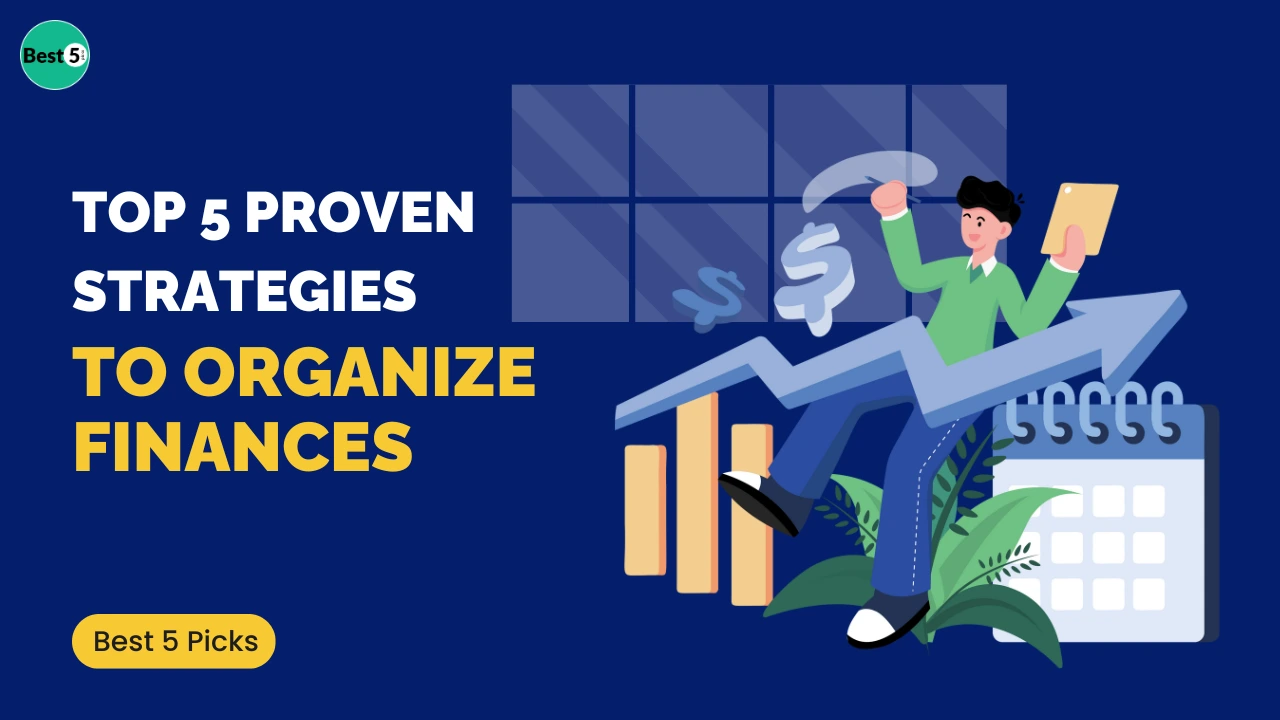Managing money is one of the most essential life skills, yet many people struggle with it. Personal finance is not only about saving money but also about creating a plan that ensures financial stability, growth, and security. Without a structured approach, it is easy to lose track of income, overspend, and end up in debt.
The good news is that organizing your personal finances does not require complicated tools or professional accountants. With the right strategies, anyone can take control of their financial journey. This article will highlight the Top 5 Proven Strategies to Organize Your Personal Finances, giving you a roadmap to build better financial habits and achieve long-term success.
1. Create a Realistic Budget to Organize Your Personal Finances
Key Features:
- Helps you track income and expenses.
- Prevents overspending and debt accumulation.
- Provides a clear picture of where your money goes.
- Allows you to allocate funds for savings and investments.
- Builds discipline in financial decision-making.
A budget is the foundation of personal finance management. It acts as a blueprint that guides you in spending wisely and saving consistently. By creating a monthly budget, you get to see exactly how much money comes in and where it goes.
Start by listing all your income sources and fixed expenses such as rent, utilities, and loan payments. Then allocate money for flexible expenses like groceries, entertainment, and dining out. The remaining portion should be directed towards savings and investments.
A realistic budget helps you live within your means and ensures you are financially prepared for unexpected expenses. It is the first and most effective step to organize your personal finances.
2. Build an Emergency Fund for Strong Financial Security
Key Features:
- Acts as a financial safety net during crises.
- Covers unexpected medical bills, job loss, or emergencies.
- Prevents reliance on credit cards or loans.
- Reduces financial stress and anxiety.
- Ensures stability without disrupting your goals.
Life is unpredictable, and emergencies can strike anytime. Having an emergency fund is one of the smartest ways to stay prepared. Ideally, this fund should cover at least three to six months of essential living expenses.
Start by setting aside a small portion of your monthly income into a separate savings account. Gradually, this account will grow into a substantial safety net. Having such a fund ensures that you do not dip into your long-term savings or investments during a crisis.
An emergency fund not only strengthens your financial security but also helps you maintain peace of mind. It is an indispensable strategy to organize and safeguard your personal finances.
3. Reduce Debt and Manage Credit Wisely
Key Features:
- Lowers financial burden and interest payments.
- Improves credit score for future borrowing needs.
- Frees up money for savings and investments.
- Encourages responsible borrowing habits.
- Prevents financial stress and instability.
Debt is one of the biggest obstacles to achieving financial freedom. High-interest loans, especially credit card debt, can quickly spiral out of control. To organize your personal finances, focus on paying off high-interest debts first while making minimum payments on others.
Developing a repayment plan is key. Methods like the “debt snowball” (paying off the smallest debts first) or “debt avalanche” (paying off the highest interest debt first) can be highly effective.
At the same time, learn to use credit wisely. Avoid unnecessary borrowing and keep your credit utilization below 30%. By reducing debt and managing credit responsibly, you make room for a healthier financial future.
4. Automate Savings and Investments for Consistency
Key Features:
- Ensures regular contributions without effort.
- Helps in building long-term wealth.
- Reduces temptation to overspend.
- Creates financial discipline and consistency.
- Maximizes the power of compounding.
One of the biggest challenges in personal finance is the tendency to delay saving. By automating savings and investments, you make it a priority instead of an afterthought.
Set up automatic transfers to your savings account or investment funds right after receiving your salary. This way, you “pay yourself first” before spending on anything else. Over time, this habit builds a strong financial foundation.
Automating contributions to retirement accounts, mutual funds, or fixed deposits ensures that your money grows without constant monitoring. It is a reliable way to strengthen your personal finances.
5. Track Spending and Review Personal Finances Regularly
Key Features:
- Helps identify unnecessary expenses.
- Keeps you accountable for your money habits.
- Ensures alignment with financial goals.
- Provides insights into long-term financial patterns.
- Allows timely adjustments in budgeting and saving.
Tracking your spending habits is crucial to understanding your financial behavior. Use apps, spreadsheets, or simple journals to record daily transactions. This transparency helps in pinpointing areas where you can cut down expenses.
Regular financial reviews—monthly or quarterly—allow you to measure progress towards your goals. For example, you can check if you are meeting your savings targets or staying within budget.
Consistent reviews not only highlight areas of improvement but also help in setting realistic future goals. This strategy ensures you stay in control of your personal finances.
Conclusion – Top 5 Proven Strategies to Organize Your Personal Finances

Organizing personal finances is not a one-time effort but a continuous process. The Top 5 Proven Strategies to Organize Your Personal Finances—budgeting, building an emergency fund, reducing debt, automating savings, and tracking spending—are simple yet powerful steps that anyone can follow.
By applying these strategies, you create a system that brings order, stability, and growth to your financial life. It not only helps you achieve financial goals but also provides peace of mind knowing that you are in control.
Financial discipline today ensures a secure tomorrow. The sooner you start organizing your finances, the faster you will build wealth, stability, and independence.
Detailed Table: Top 5 Proven Strategies to Organize Your Personal Finances
| Strategy | Key Benefits | Practical Tips | Long-Term Impact |
|---|---|---|---|
| Create a Budget | Tracks income & expenses, prevents overspending | List all income & expenses, allocate savings first | Builds discipline and financial clarity |
| Emergency Fund | Provides security during crises | Save 3–6 months of expenses in a separate account | Reduces stress, prevents debt in emergencies |
| Reduce Debt | Lowers interest payments, improves credit score | Focus on high-interest debts, use debt snowball/avalanche | Frees income for savings and investment |
| Automate Savings | Ensures consistency, harnesses compounding | Set auto-transfers to savings and investments | Builds wealth steadily over time |
| Track Spending | Improves accountability & financial awareness | Use apps or journals, review monthly | Helps adjust goals and spending patterns |
FAQs on Top 5 Proven Strategies to Organize Your Personal Finances
1. What is the first step to organize personal finances?
The first step is to create a realistic budget that tracks income and expenses.
2. How much should I save in an emergency fund?
Ideally, you should save three to six months’ worth of essential expenses.
3. Is it better to pay off debt or save money first?
Focus on paying off high-interest debt while maintaining small savings for emergencies.
4. How can I stick to my budget consistently?
Track spending daily, set realistic goals, and review your budget regularly.
5. What are some tools to track spending?
You can use apps like Mint, YNAB, or simple spreadsheets and journals.
6. Why is automating savings important?
Automation ensures consistency and prevents the temptation to spend money elsewhere.
7. How can I manage credit cards wisely?
Pay the full balance on time, avoid overspending, and keep utilization below 30%.
8. What financial reviews should I do monthly?
Review income, expenses, savings goals, and debt repayment progress.
9. Can personal finance strategies help in wealth creation?
Yes, they provide structure and discipline, which are essential for wealth-building.
10. What’s the long-term benefit of organizing personal finances?
It ensures stability, reduces financial stress, and helps you achieve life goals.









